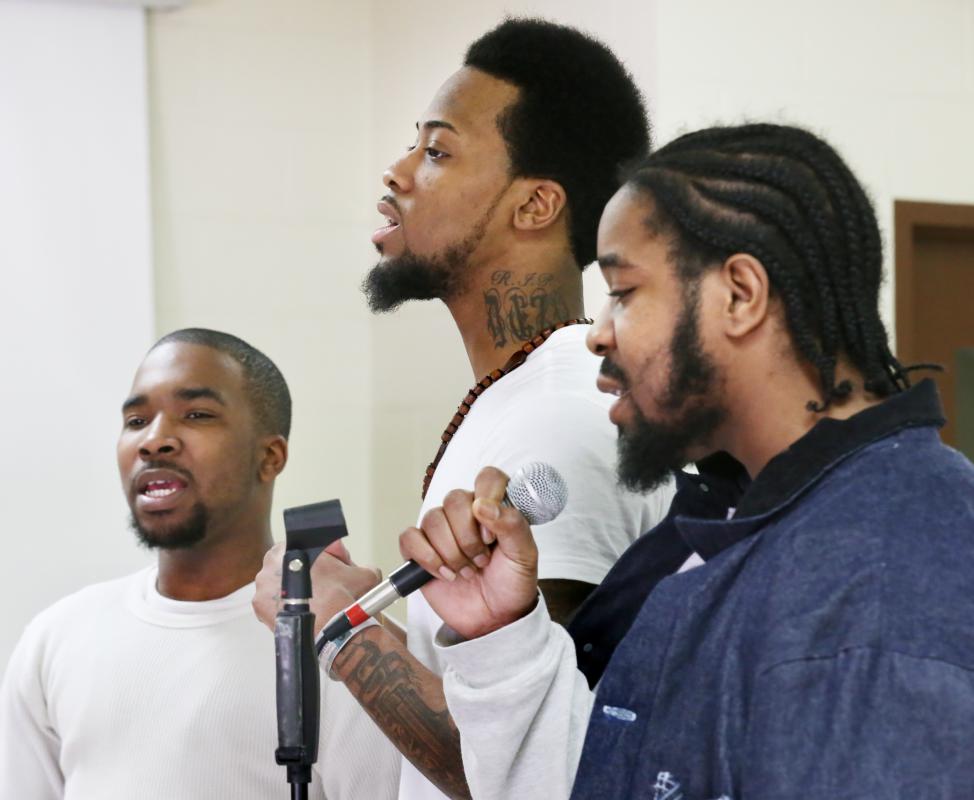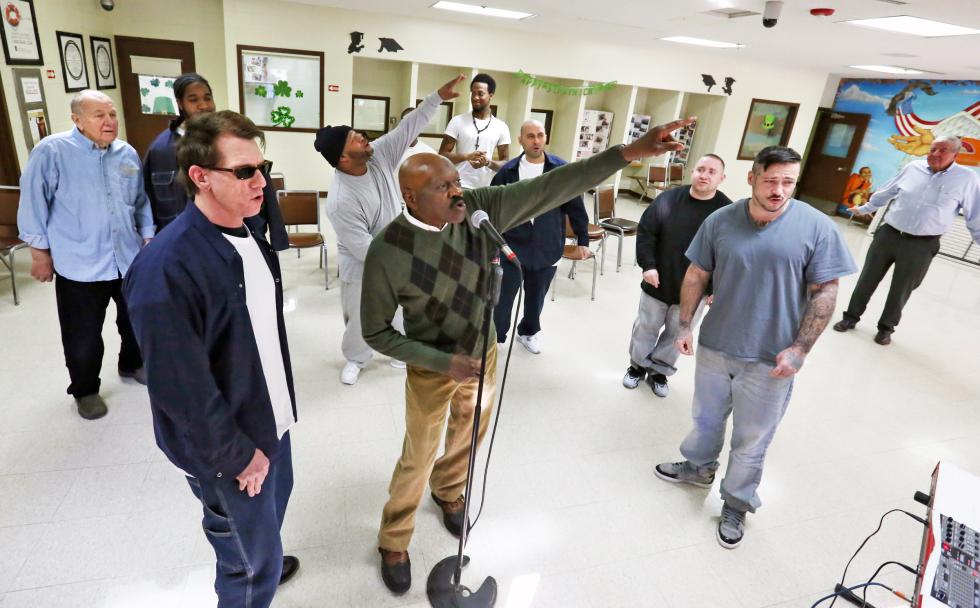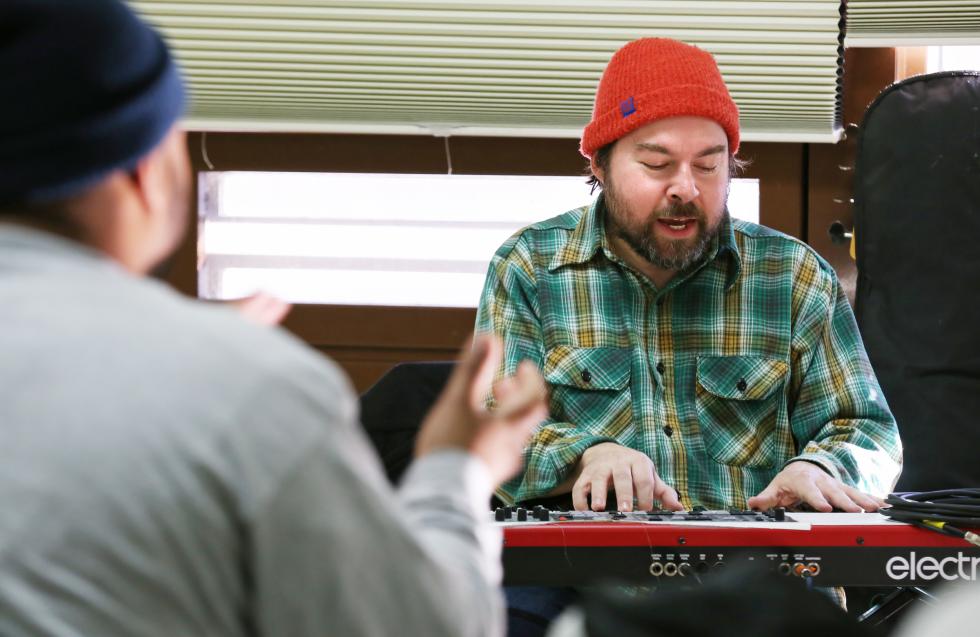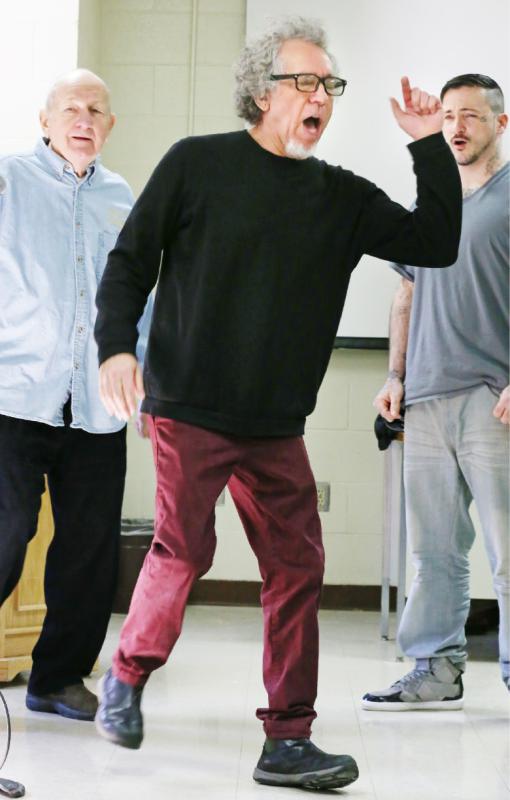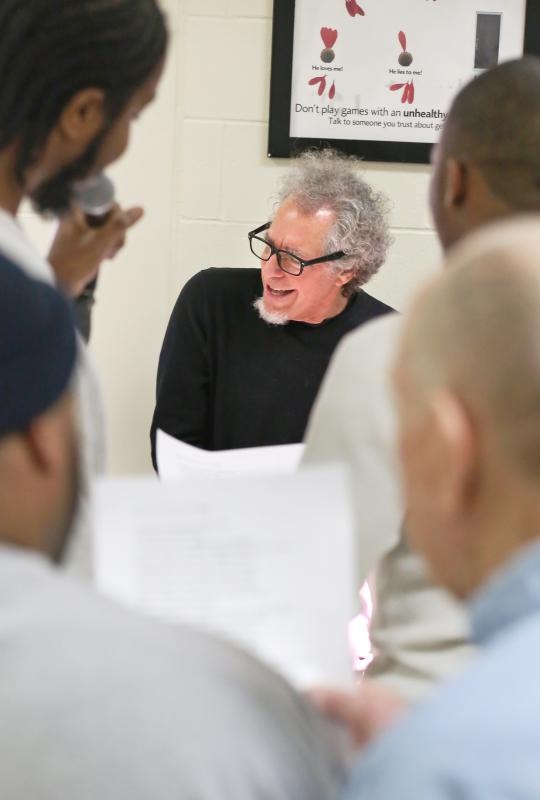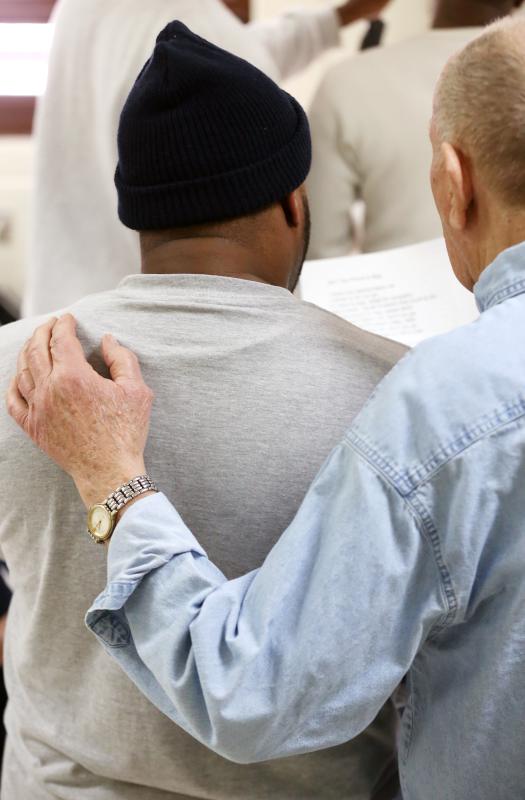It’s mid-morning at the Hampshire County Jail and House of Correction. Eight inmates are gathered around an electric keyboard in the visiting room, laughing and talking quietly.
Keyboard player Ken Maiuri hits middle C, and together they warm up with some scales. Up and down, they sing: “la-la-la-la-LA-la-la-la-la,” then one note higher: “mi-mi-mi-mi-MI-mi-mi-mi-mi.” Then one note higher, and higher again.
Up front, next to Maiuri, stands Young@Heart Chorus Director Bob Cilman, who sings along as he listens to the group, tracking just how high they can go. Also visiting the prison today are two regular members of the Young@Heart chorus: 86-year-old Stephen Martin and 79-year-old John Rinehart. They stand among the inmates and sing along.
Young@Heart’s new Prison Project is still in its early stages, but the mission is simple: to cultivate a fun and ongoing relationship between the main group’s seasoned cast of singers and interested members of local prison populations through on-site rehearsals.
Cilman, Maiuri, and a pair of chorus members pulled on rotation have been coming here since October to lead rehearsals for a group of about a dozen inmates from the medium-security and minimum-security wings of the prison. This structured singing time is designed to be a break from the rest of the week’s programming, which features daily group sessions on anger management, substance abuse, accountability, and victim impact, explained Assistant Deputy Superintendent Melinda Cady.
“We ask a great deal of the men here,” said Cady. “In turn, we want to support the whole person … the Young@Heart chorus gives these guys an opportunity to see themselves in different roles, as members of something good.”
Not every inmate shows up consistently to rehearsal, which is held weekly on Wednesdays. But over the past five months, something of a community has grown out of the endeavor. The inmates have gotten to know each other better, and they are increasingly less shy about singing. Today, they are polishing up a set list for a show that they will perform in May for the other inmates and a handful of guests.
And they’ve given themselves a name: The Old Souls. It’s a winking reference to their collaboration with Young@Heart, the choral group that Cilman formed in 1982 for members of a Northampton elderly housing project. The chorus is for senior citizens only — the minimum age to join the chorus is 73, and the group’s average age is 82.
Back in 2006, Young@Heart performed a show at the Hampshire County Jail. The inmates’ response to the performance, which forms a pivotal scene in the 2007 Channel 4/Fox Searchlight documentary Young@Heart, was enthusiastic.
“That first concert was so eye-opening,” Cilman said. “Over the course of an hour of singing, something powerful happened between us and the inmates. It was such an intense day.”
Since then, Cilman has been mulling over an initiative to sing with, not just for, the prison population.
Such collaborations aren’t new for Young@Heart. Cilman recalls the chorus performing, for example, with a group of breakdancers in the mid-1980s, and with the Pioneer Valley Gay Men’s Chorus.
These incarcerated men have more troubled backstories than those breakdancers, but that doesn’t affect Cilman’s goals. “I don’t know what anyone has done to get there, and I’m not interested,” he said. “That’s not my business. I just know that these guys are coming back into the community, and I want to see them come back in the best possible way. And in a small way, I think this can be really helpful.”
“Helpful” can mean a number of things, as several inmates explained after rehearsal. For Nelson Aponte, it meant contributing to a group effort and feeling positive about it. Aponte, 37, is serving 10-12 years for theft. “I said, I’ll give it a shot, you know? Just to go,” he said. “I wasn’t going to be part of this — I was just going to check it out.”
After the first rehearsal, Aponte still wasn’t sure he wanted to participate, so he called his grandmother. “She said, ‘If you take 10 percent of what you do normally on the streets and put it into something besides crime or being a delinquent, you might enjoy something,’” he said. “So here I am.”
The entire sentenced population — just over 100 men — was in this room for a mandatory screening of the Young@Heart movie last year, said Chris Barre, 37, of Greenfield. “I thought it was awesome. I was looking at these people, thinking, damn, I want my kids and grandkids to see me like this.”
Barre is serving two to three years for breaking and entering. He enjoys coming to rehearsal each Wednesday, he said, because “here you get to start your week over. We walk back to the block and we’ll be singing. You can hear us singing all over the place.”
“You got 100 people upstairs, and only 12 show up to this? It doesn’t matter,” said Aponte. “You got this here. They come to show you how to get out of your comfort zone and express yourself.”
The fact that Martin and Rinehart, too, have taken the time to visit leaves an impression, said Barre. “When you see people like Steve and John, you see they’re happy, and they have crazy energy. Everybody looks up to them. I’m looking forward to being like that.”
1, 2, 3, 4!
Cilman pulls up a microphone on a stand. “Here it is. Just come up to it. We’re starting with ‘My Girl.’” Maiuri launches into the opening bars. Three men stand together at the mic, trading off verses, while the rest stand behind and sing back-up, snapping their fingers and tapping their feet.
“I’ve got sunshine on a cloudy day/ When it’s cold outside I’ve got the month of May/ I guess you’d say/ What can make me feel this way?”
Each of the three lead singers ducks closer to the mic to sing, one by one: “My girl… My girl… My girl…”
Cilman paces. When he nods, his big mop of curly graying hair bounces encouragingly. He moves like the quintessential choral director: he is wound up, with fidgety hands and neck muscles held tight from years of lean-in listening, but he moves with a certain fluidity in the hips, always ready to groove a little to a particularly well-sung line.
Some inmates sing while looking at the floor in front of them, nodding and concentrating. Some stare ahead distractedly, barely moving their lips. Others are putting some real soul into their crooning, rocking and swaying and smiling.
The songs ends. Cilman gives a thumbs-up. “Excellent. Excellent.”
The performance wasn’t flawless. But as Cilman pointed out, that’s not a big issue. “It’s raw. These are not professional singers. But that’s always been the truth of Young@Heart as well. Pitch and rhythm don’t always come first. What matters is honesty — how you’re feeling the song as you sing it.
“Look,” he added, “proper training isn’t the only thing going on when you listen to music. The most brilliantly on-pitch singing voice can put you to sleep in five seconds. So, I’ve always worked with people who aren’t professional singers.”
The inmates interviewed don’t seem to have any delusions on this point either.
“When I first started I was nervous,” said Sherod Green, 22, from New Jersey. “I never really sang. But now I just get up there and do it.”
Green is here for a year on a drug violation. He gestured to Michael Williams, 21, of Springfield, who is serving a year for receiving stolen property. “He grabbed me one day, like: you ain’t doing nothing. You might as well just come down. I didn’t know what to expect at first.”
But the energy in the room was positive, he said. “I just vibe with it. And I like it now.”
Williams said he used to rap and sing before he was incarcerated, and that rehearsals have helped him to feel less nervous about performing in public. “They help us get through it. Like, when I’m shy and don’t want to do a song, they all give me energy. Like, go do it, go do it — we got your back.”
“For me, it’s relieving stress,” said Green. “It’s a stress reliever. And it’s fun.”
Rehearsal shifts gears, and “My Girl” gives way to “Help Me” by Johnny Cash. Cash’s tune was selected by the inmates. Cilman hadn’t heard of it before October, but by now everyone in the chorus knows it backwards and forwards. At a slower tempo and a lower volume, the words of this prayerful ballad rise from the group like a dialed-up flame in a kerosene lamp:
“Oh, lord, help me walk/ Another mile, just one more mile/ I’m tired of walkin’ all alone/ And lord, help me to smile/ Another smile, just one more smile/ Don’t think I can do things on my own…”
As they sing, the men’s voices drop firmly into the groove carved out so cleanly by Cash 40 years ago:
“I never thought I needed help before/ Thought that I could get by, by myself/ But now I know I just can’t take it any more/ And with a humble heart, on bended knee/ I’m beggin’ you please for help…”
When the song ends, the room is silent for a moment. Then the tone shifts, and the guys leap headlong into a rendition of “Waiting Room,” a song by ’80s hardcore rock band Fugazi.
It’s during this headbanger that Sheriff Robert Garvey walks in. He comes up alongside the group to listen for a few minutes, bouncing his shoulders and shaking his feet in a little dance. A few inmates see him getting down, and they whoop and clap for him.
Garvey has been sheriff here for 31 years. In an interview after rehearsal, he recalled that original performance by Young@Heart at the jail in 2006. “We’ve always encouraged Bob to come back and do something else,” he said. “He’s just a super talent, and the inmates really respect what he’s doing.”
When Cilman called up last year to suggest a chorus project at the jail, Garvey said he was “a little nervous” about the potential lack of interest from inmates. “But I thought the worst thing that could happen is we cancel the program. We certainly wanted to give it every opportunity to succeed. And it has.”
A former Amherst selectman and Hampshire County Commissioner, Garvey said his background in education has motivated him to put a big focus on programming at the facility. Over the years, the jail has sought to balance its criminal education programs with more social, stress-relieving programs, which have included theatre, music, woodworking, mechanics, and computer science.
“We’re in the business of dealing with people who have problems, and addressing those problems,” he said. “If we’re going to be successful at all, we have to provide a climate where change can take place.”
Senior vision
In the rehearsal room, ”Waiting Room” transitions into “Express Yourself,” an ’80s cover by the hip-hop group N.W.A. of a song by Charles Wright & the Watts 103rd Street Rhythm Band. The next two songs — “Holla If You Need Me” by Trey Songz and “Yo (Excuse Me Miss)” by Chris Brown — are much newer.
It’s an eclectic set list, to be sure, but a far-flung mix of classic and contemporary is nothing new to Young@Heart. Just ask Martin and Rinehart, who have both come to visit numerous times since October. “We’ve become a family,” Martin said. And that success comes down to the fact that music is “an intergenerational language.”
Like Cilman, Martin and Rinehart see their role here as fun-making and, hopefully, inspiring. “They look at us and see how old we are,” said Rinehart. “Our careers are over, But this is a tremendous joy for me. And the prisoners look at us not so much as role models, but just as something they can do later on in life, if they want to pursue the music.”
“We didn’t get to this age without a lot of experiences,” said Martin. “For the love of God, I could be in here and they could be out there … It could have been the other way around so many times.”
Empathy and patience, then — for yourself and for each other — are key. Which was hard, they admitted, on day one.
Before a modicum of comfort and trust grew out of all these hours logged together, Martin observed that some inmates were reluctant to sing. “It’s not easy to put a program like this into an institution like this and expect people are going to throw themselves at it,” he said. “It takes time to break through barriers sometimes. But you saw the results. There was some great music performed today.”
One of the last songs the group sings is the R&B classic “Tell It Like It Is.” Things click into place. Everyone snaps their fingers. Two guys do a little doo-wop shuffle. A few in the back find their falsettos for a little “oooh oooh” harmonizing.
The song winds down. Cilman is smiling. “That’s great,” he says. “That’s just the energy we need.”
The following day, Cilman is rehearsing with the full Young@Heart chorus at the Florence Civic Center. Afterward, he appears tired, but level-headed. The chorus has a show coming up at the Academy of Music in Northampton on April 1, which will not only be a chance to share what the chorus has been rehearsing on their own lately — it will be Cilman’s opportunity to make some announcements about the Prison Project’s recent work.
Lately something has changed in rehearsals at the Hampshire County Jail, but he has trouble explaining what it is. “Polished it will never be,” he says, “but it is more soulful. I think they’ve started believing in the whole thing more.”
On the first day of rehearsal, Cilman asked Nelson Aponte how long he had been singing. “Since 10 o’clock,” Aponte responded. “No, in your life,” said Cilman. “Since 10 o’clock,” Aponte said.
“He has a beautiful voice, Nelson, but a lot of these guys hadn’t thought about singing as an activity,” Cilman says.
Still, he resists the notion that swooping in with an agenda brings positive change quickly. “It sounds like a good idea, right?” he says. “But it only becomes a good idea later, when you do it and you see that it’s worthy of being done. Lots of good ideas don’t work when you try them. But this has passed that threshold. I’m really happy about that.”•
Contact Hunter Styles at hstyles@valleyadvocate.com.

